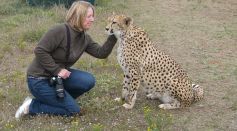ENVIRONMENT & CLIMATE
How Many Species Are There on Earth? Experts Say Counting All Species Will Never End

Oversized Goldfish Wrecks Havoc Over Minnesota Lake, People Warned of Possible Ecosystem Destruction

1,600-Year-Old Sheep Mummy Reveals Husbandry Practices in Ancient Iran
Froghoppers Can Generate Extremely Negative Pressures, Making Them the Animal World's Super-Suckers
Rare 'Glass Octopus' Spotted in Deep Waters of the Central Pacific Ocean

Massive Elsa Hits Lesser Antilles, First Atlantic Hurricane of 2021 Came Earlier Than Expected

Farm Robots: Ecological Future or Impending Disaster?

NASA, Purdue Team Fly Miles Above Earth up to 70,000 Feet, to Study Data on North American Monsoon Season

Indigenous Peoples Defend the Peruvian Amazon With Modern Technology

Genetic Markers That Control Sunflower Oil Traits Discovered in New Study

Can Dogs Communicate Effectively to Humans? Compared to Other Domesticated Animals, Canines Cooperate the Best

Experts Analyzed Genomes of Early Caucasian Human Without Using Skeletal Remains

Dino-Killer Space Rock Left Fossilized Megaripples of Mile-High Giant Tsumami

Humans' Defenseless Nature: Still, Why Don't Wild Animals Attack Us More?
Most Popular

Why Stars Twinkle: Flickering Explained by Atmospheric Turbulence and Light Distortion

The Role of Materials Science in Engineering: How Modern Engineering Materials Drive Innovation

Tornadoes vs. Waterspouts vs. Dust Devils: Key Differences and Vortex Types Explained

Climate Adaptation Strategies Explained: How Societies Respond to Climate Change




